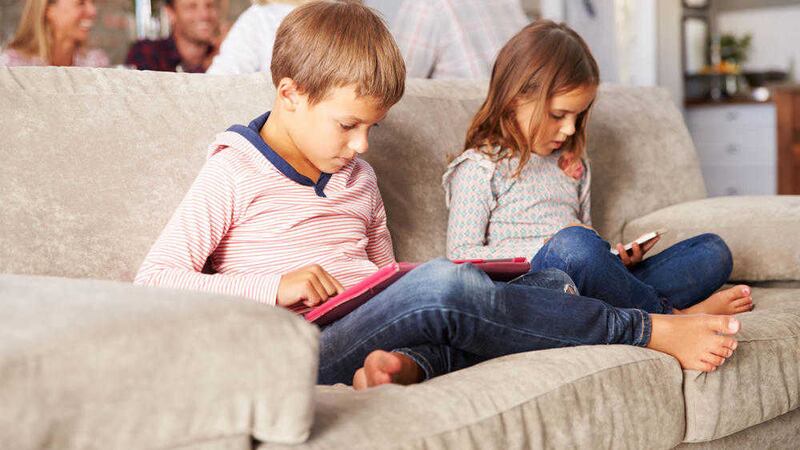AS WELL as agonising over traditional age-appropriate issues such as when is a child old enough to walk to school on their own, many modern parents are also debating the hot topic of when to give children their first mobile phone.
Although new research suggests that the average age parents believe it's appropriate to introduce children to mobile devices is eight, it also found that 92 per cent of children in Britain and the north aged two to seven years currently use mobile technology.
Indeed, the Logitech study found 40 per cent of parents believe children should be given access to mobile devices before the age of five, with the majority (84 per cent) saying mobile devices are important to children's education and 34 per cent stating they 'prepare children for a digital future'.
When it comes to buying a child their own mobile device, Vicki Shotbolt, chief executive of Parent Zone (parentzone.org.uk), which helps parents navigate the digital world, says it's a decision for individual parents based on what they know about their child, and their own family circumstances.
"If you can afford to have two tablets in your house, for example, that might be a better way to go, as one can be set up solely for the children," she says.
"I certainly don't think anyone should be saying you're a bad parent if you buy your child a tablet before they're, say, eight. These children are growing up surrounded by technology, so we'd be very strange parents if we tried to exclude them from that.
"The whole point of parenting is socialising your child into the world they're growing up in, and teaching them how to use technology responsibly is, I would say, one of the most important things you can do now."
The expense, of course, can be huge, but as children communicate to a very large extent through mobile devices, it's hard not to shell out – although some parents wait longer than others to allow their children to have their own mobile, and will often pass on their own handset when they upgrade.
"Mobiles are how young people communicate, homework is often done online and parents want to stay in touch with them and make sure they're safe and can get in touch if anything happens.
"A child that doesn't have access to a mobile device is likely to be missing out from their peer group because they all have them."
Rather than buying very young children their own mobile phone or tablet, many parents allow them to play with their devices – although the Logitech research found 36 per cent of children have damaged a tablet or smartphone.
But Shotbolt says parents don't have to hand over their own devices to keep kids entertained, as there are now many internet-enabled devices specifically designed for children, from Curio tablets and Leapfrog products to the internet-connected Hello Barbie dolls. Parental controls on most of these devices are preset, as opposed to parents having to customise devices for their children.
"Internet-enabled toys are going to come on exponentially over the next year or so, so the idea of very young children having devices that are like their parents' is increasingly out of step with reality," she says.
"That very clear line of when does a child get their first mobile phone is going to become a moot point because children will have their own devices that connect to the internet in all sorts of ways."
However, in her opinion it's "absolutely fine" for a parent to let their child play with their mobile phone, if it's been set up with a profile for the child, security settings, appropriate filters etc.
However, she admits that getting parents to set phones up correctly for their children to use is a much bigger challenge.
"Especially when children are very little, parents forget they're incredibly adept at finding their way around technology. Even little fingers can wander."
Ofcom says 31 per cent of parents of children whose phone can be used to go online have put filters in place. The proportion of parents who enable controls or filters isn't known.
Shotbolt acknowledges that many parents may not set up separate child profiles or filters on their own mobile devices used by their children simply because they don't know how, or they think it's hard to do.
Generally, parental controls can be found in the device settings menu, and Shotbolt says service providers are very good at providing information about the controls.
"It really only takes 10 minutes once you've found where to look," she promises, pointing out that there's advice on Parent Zone about how to set up parental controls.
However, she says: "There are definitely signs that manufacturers are starting to recognise the fact that parents share their devices with their kids and it's got to be easier to set them up."
Shotbolt says it's also important to set boundaries about mobile use and talk to children about what they do online.
"Just like you wouldn't let your five-year-old out of the door without asking where they were going, you have to apply the same logic with a phone. You know who their real-life friends are, and you should know who their online friends are too."








